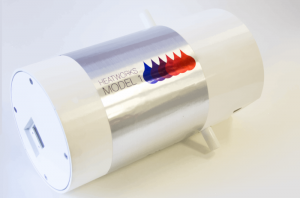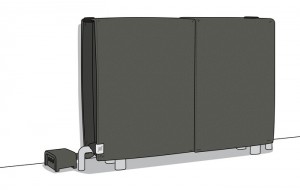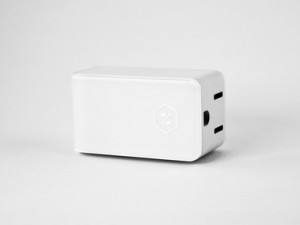The pace for cleantech crowdfunding successes has been set for 2014. And it’s quick. Already this year, we’ve seen three startups launch campaigns on Kickstarter for energy efficiency boosting and home automation devices. Two have blown through their funding goals while the third appears to be on its way—not to mention that all have successfully raised seed funding around the same time.
Crowdfunding platforms have also gained traction so far this year, including a new residential solar-focused loan program from pioneering crowdfunding platform Mosaic, and the launch of two new platforms. The first, Clean Reach, is focused on funding ocean energy-related endeavors and currently has a handful of active campaigns that include a wind turbine and wave energy-harnessing technology. The next, AgFunder, plays in the agriculture and natural resources space and recently launched its first campaign that seeks to raise money for a California agricultural data company, OnFarm.
Looking at this sampling of developments, it appears that the crowdfunding mechanism has made its transition to the cleantech space, and consumers and investors are showing their support with their wallets.
ISI Technology Crowdfunds for Efficient Water Heaters
ISI Technology’s Kickstarter campaign for an efficient electric water heater, which ended Feb. 16, is a gleaming example of the public’s appetite for more efficient appliances and smart home devices. The football-sized Heatworks Model 1 raised almost $440,000—more than $300,000 more than the company’s goal.
Following the campaign, the company announced on Feb. 20 that it raised $2 million in seed funding from existing investors to support a national rollout later this year.
The Model 1 uses a patented “direct electric resistance” technology that heats the water using its own natural resistance to directly energize and heat the molecules. The process produces an immediate and constant flow of hot water, only heating what is being used. As a result, 40 percent less energy and 10 percent less water is used compared to a typical electric tank water heater, according to the company.

“Every time you turn on the water tap, you save between 1 and 2 gallons of water per minute,” ISI Technology Founder and Chairman Jerry Callahan says in the company’s Kickstarter video. “At an average of 20 hot water draws per day per house, that’s 20 to 40 gallons of water every single day.”
ISI Technology claims the Model 1 is different from other tankless electric water heaters because it doesn’t have their existing failure modes and has more precise temperature control. The device measures the water 60 times per second. If you’re not sold on completely replacing your conventional water heater, the Model 1 can instead be placed on the outlet side to almost double the amount of useful hot water available.
The company plans to roll out WiFi compatibility this spring, allowing for remote measuring and control of temperature and power levels.
The Model 1 has been in the works since 2006 and has now raised money for production tooling to complete the WiFi integration and to build the first few thousand units. Previously, ISI Technology received $200,000 from the South Carolina Research Authority (SCRA), $30,000 from an undisclosed investor and $200,000 in structured debt from SCRA.
The device was sold for $225 on Kickstarter, but will retail for $395. Expected ship date is March 2014.
Radiator Labs Crowdfunds Radiator Efficiency for Urban Dwellers
Also, looking to elevate outdated home heating appliances, Radiator Labs has created a sort of oven mitt for steam radiators equipped with temperature sensors, a small fan and a WiFi chip. After three years of development, Radiator has launched a Kickstarter campaign for the Cozy. The funding goal is set at $100,000 and ends March 6.
So far, they’ve raised a third of that goal with about two weeks to go.
The Cozy’s thermal insulated cover fits over the steam radiator while the attached sensor monitors the temperature in the room. When the temperature dips below the preferred setting, the fan starts up and blows the trapped hot air into the room. When it reaches the right temperature, the fans click off.

The WiFi chip in each Cozy communicates with an App, thus turning your smartphone into a mobile thermostat. With 100 million radiators in the United States, the market is large and untapped. The Cozy is priced at about $300 on Kickstarter now and will ship in October of this year.
Apart from vastly improving the comfort level of old drafty apartment dwellers, there’s significant environmental benefit achieved by using the Cozy, according to the company. Boilers used for steam-heated buildings are one of the largest contributors to air pollution because the oil is burned onsite. The wasted energy is a big incentive as well—each radiator wastes about 20 gallons of oil each year; this represents $7 billion in wasted fuel nationally, said to Marshall Cox, Radiator Labs founder and CEO.
Coinciding with the Kickstarter campaign, Radiator Labs is wrapping up its first seed round, raising about $300,000 from a group of investors that includes the Dorm Room Fund. But it’s not stopping there. In the next month or so the company plans to begin raising a Series A round.
Radiator Labs is also part of the current class of NYC ACRE, a New York City cleantech incubator program, along with 12 other startups. In 2012, the Cozy earned the MIT Clean Energy Prize and the $220,000 check that goes with it. Radiator Labs was also a contender in the 2012 Northeast Cleantech Open.
Zuli Crowdfunds for Smartplug Connected Home Devices
The third Kickstarter darling of 2014 is San Francisco startup Zuli. Sitting squarely in the connected home space, Zuli raised $175,000—$25,000 more than its goal—in early January for its Smartplug device. Riding in the wake of Nest’s acquisition by Google, Zuli has been attracting attention from Silicon Valley investors. Zuli CEO Taylor Umphrey said the company is closing a seed round led by Menlo Ventures and XG Ventures, but didn’t disclose a final figure.
They are also currently raising money through Angel List, which shows an investment of $150,000 in September 2012 from managing partner of the Plug & Play Tech Center in Silicon Valley, Alireza Masrour, and Steve Umphreys, co-founder of Callisma, a network services company. Zuli is a 2012 fall graduate of Plug & Play’s Startup Camp and one of the three audience-voted winners from the Expo at the end of the session.
Zuli founders spent a lot of time focused on making their product simple and easy to install, said Umphrey. And from the way the company describes the usability and functionality, it sounds like a set-it-and-go solution. Zuli’s Bluetooth 4.0-enabled Smartplug goes directly into the wall socket; users then connect their appliances and lights.
Using the iOS 7 application, users can control their connected space heater, lights, and other appliances. The exciting feature lies in the location tracking, which requires a minimum of three plugs for accuracy. Users can set preferences so the connected devices react to their presence by turning on, and conversely their absence, by shutting off or lowering settings.
There are other features, too, including scheduling devices to turn on and off remotely and allowing users to monitor energy consumption from both a cost and watts perspective. The company is taking pre-orders now with an estimated ship date of sometime this summer for $45 per Smartplug.

Zuli decided to raise money through Kickstarter to prove market traction and set up manufacturing. The seed funding will do some of that but also will enable the company to ramp up operations and hire for its engineering, marketing and sales teams, Umphrey said.